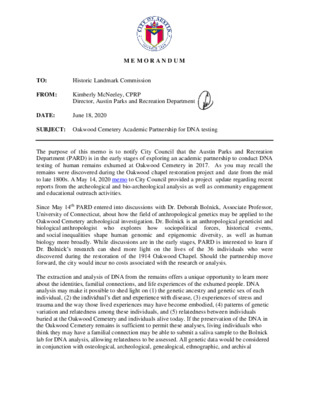2.A - Oakwood Cemetery (1) — original pdf
Backup

M E M O R A N D U M TO: FROM: Historic Landmark Commission Kimberly McNeeley, CPRP Director, Austin Parks and Recreation Department June 18, 2020 DATE: SUBJECT: Oakwood Cemetery Academic Partnership for DNA testing The purpose of this memo is to notify City Council that the Austin Parks and Recreation Department (PARD) is in the early stages of exploring an academic partnership to conduct DNA testing of human remains exhumed at Oakwood Cemetery in 2017. As you may recall the remains were discovered during the Oakwood chapel restoration project and date from the mid to late 1800s. A May 14, 2020 memo to City Council provided a project update regarding recent reports from the archeological and bio-archeological analysis as well as community engagement and educational outreach activities. Since May 14th PARD entered into discussions with Dr. Deborah Bolnick, Associate Professor, University of Connecticut, about how the field of anthropological genetics may be applied to the Oakwood Cemetery archeological investigation. Dr. Bolnick is an anthropological geneticist and biological anthropologist who explores how forces, historical events, and social inequalities shape human genomic and epigenomic diversity, as well as human biology more broadly. While discussions are in the early stages, PARD is interested to learn if Dr. Bolnick’s research can shed more light on the lives of the 36 individuals who were discovered during the restoration of the 1914 Oakwood Chapel. Should the partnership move forward, the city would incur no costs associated with the research or analysis. The extraction and analysis of DNA from the remains offers a unique opportunity to learn more about the identities, familial connections, and life experiences of the exhumed people. DNA analysis may make it possible to shed light on (1) the genetic ancestry and genetic sex of each individual, (2) the individual’s diet and experience with disease, (3) experiences of stress and trauma and the way those lived experiences may have become embodied, (4) patterns of genetic variation and relatedness among these individuals, and (5) relatedness between individuals buried at the Oakwood Cemetery and individuals alive today. If the preservation of the DNA in the Oakwood Cemetery remains is sufficient to permit these analyses, living individuals who think they may have a familial connection may be able to submit a saliva sample to the Bolnick lab for DNA analysis, allowing relatedness to be assessed. All genetic data would be considered in conjunction with osteological, archeological, genealogical, ethnographic, and archival sociopolitical research in order to contextualize the genetic findings and better reconstruct the identities, experiences, and relations of these people. In order to undertake DNA analysis, a tooth and/or bone sample would be collected from the remains of each individual selected for DNA testing and would be returned and interred along with the remains. Nondestructive and minimally destructive sampling techniques would be used at all stages of the analysis. The samples will be analyzed in the newly constructed, 800 sq. ft. state-of-the-art Ancient DNA Laboratory at the University of Connecticut. The proposed collaboration offers an unprecedented opportunity because there is a significant dearth of ancient DNA studies from the post-colonial American South and very few studies of ancient DNA from marginalized communities in the United States, such as African Americans, Mexican Americans, and poor white communities, all of whom are represented in the Oakwood burials. Dr. Bolnick works closely with Indigenous partners to assess the genetic and epigenetic impacts of settler colonialism in the southern United States and central Mexico, and her lab is currently analyzing DNA from African American cemeteries in Texas and Georgia to help elucidate the identities and experiences of individuals interred there. Dr. Bolnick was a professor in the Department of Anthropology at the University of Texas at Austin from 2005 – 2018 and is now affiliated with the Department of Anthropology at the University of Connecticut. Joining Dr. Bolnick in this research endeavor is Dr. Maria Franklin, Associate Professor, Department of Anthropology, University of Texas at Austin. Dr. Franklin is a historical archaeologist whose research focuses on the experiences of people of African descent in the U.S. from the colonial era to the 20th century. She has published on topics that include African American cultural production and social life, race and gender, and the racial politics of archaeology. Dr. Franklin’s current research explores the lifeways of black Texans following emancipation. The team also comprises Ms. Samantha Archer, ancient DNA researcher and PhD student at the University of Connecticut. She is leading the laboratory analysis of the Sugar Land 95, a group of nearly 100 people identified in unmarked graves in Sugar Land, TX, a suburb in southwest Houston, in February 2018. Her Ph.D. dissertation will analyze genomic data from historical archaeological sites in Texas from the 19th and 20th centuries in order to investigate the molecular correlates of stress and violence experienced by African Americans in the Jim Crow South and the ways in which ancient DNA can help resurface identities of individuals lost to the historical record. PARD will continue to update city leadership and cemetery stakeholders as the project progresses. For more information and complete background on the Oakwood Cemetery archeological investigation, please visit the project website. PARD will continue to update City Council and community members on the process. Should you have any questions, please contact my office at (512) 974-6717.